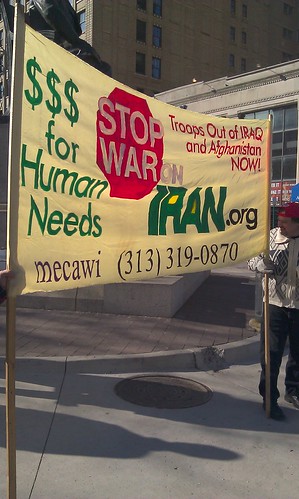
MECAWI banner at Grand Circus Park on Feb. 4, 2012. The demonstration was part of a national day of action against US aggression toward the Islamic Republic of Iran. There were protests in over 80 cities and several countries. (Photo: Abayomi Azikiwe), a photo by Pan-African News Wire File Photos on Flickr.
March 14, 2012, 8:01 p.m. ET
EU-U.S. Split on Iran Banks Seen
By LAURENCE NORMAN and JAY SOLOMON
Wall Street Journal
BRUSSELS—The European Union's new steps aimed at tightening the noose around Iran's banks are unlikely to bridge a growing gap between Brussels and Washington over how hard to push financial sanctions against the Tehran regime.
The new measures, which would ban European companies from conducting financial wire transfers for sanctioned Iranian banks, are expected in coming days, several diplomats said. One said it would be approved by member states on Thursday unless there is last-minute resistance. A second person said preparation was "very advanced."
However, while Europe prepares to act, the U.S. Senate and House of Representatives are drafting bills that would seek to blacklist essentially every Iranian bank and threaten penalties against European and other overseas companies that deal with any of these banks. The move is aimed at preventing Tehran from using untargeted banks to fund its nuclear program, which the U.S. and many EU countries say is aimed at producing nuclear weapons.
Tehran says its nuclear program is intended for peaceful purposes.
Congress's plans mean the board of directors of European companies like Belgium-based Society for Worldwide Interbank Financial Telecommunication, a financial communication and clearing system almost all the world's major banks use, could still face penalties and sanctions even if it fully complies with EU rules. Those sanctions could include banning them from the U.S. financial system, congressional aides said.
"The EU doesn't seem to realize they will still be leaving Swift open to sanctions unless they order all Iranian financial institutions expelled," one senior congressional aide said. "So they will end up having to meet all over again and figure out the incongruency" if the U.S. legislation passes.
The U.S. Treasury has already blacklisted 23 Iranian banks, the bulk of which are also targeted by the EU. But lawmakers say Tehran is using more than 20 other banks to finance its nuclear program and support for regional militant groups. Lawmakers are also preparing to target communications, software and technology companies that continue doing business with Iranian banks.
Several EU officials said they are aware of the likely steps from Washington but that the EU is sticking to its plan to ban only financial transactions with sanctioned banks.
One diplomat said the financial transactions ban will "exactly mirror" the sanctions announced on banks, including the central bank. That means that while most business with the central bank are prohibited, some payments will be allowed for legitimate trade-related purposes.
"These exceptions should also be valid for Swift," the person said.
Swift has already said it is ready to cut off sanctioned Iranian banks and companies once the EU "has clarity" on the legislation it is drafting. It has not said whether it will cut off all business with Iran's central bank.
The European measure comes at a critical moment for Iran's relations with the West. An EU diplomat said talks are expected to resume in April on Iran's nuclear activities between Tehran and six major powers, with the onus on Tehran to prove its nuclear program is intended for peaceful purposes.
On Wednesday, as Iran formally requested a date and venue for talks, U.S. President Barack Obama warned Iran that the "window" for solving the nuclear issue peacefully was "shrinking."
The U.S. and the EU have worked in tandem to significantly ratchet up sanctions on Tehran. The EU is imposing a ban on Iranian oil exports and has slapped restrictions on hundreds of other firms and officials. The U.S. also tightened its sanctions on Iran's central bank.
Write to Laurence Norman at laurence.norman@dowjones.com and Jay Solomon at jay.solomon@wsj.com
No comments:
Post a Comment